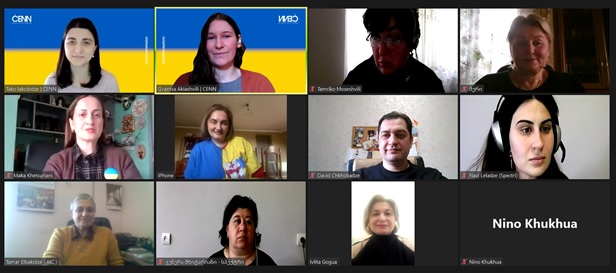CENN, within the “Continued nationalisation of SDGs in Georgia” project, supported by the German Government, started collaborating with non-governmental organisations and civil activists from 5 cities to strengthen efforts at the local level in the SDGs implementation process.
In April, the first meetings with non-governmental organisations and civil activists in Batumi, Kutaisi, Zugdidi, Telavi and Rustavi were held. Representatives of more than 45 NGOs discussed the importance of local activities and their involvement in pursuing global sustainable development goals.
The civil society actors got acquainted with the goals and the activities planned in the regions within CENN’s new “Continued Nationalisation of SDGs via Promoting Localisation and Multi-stakeholder Engagement in Georgia” project. They exchanged views on existing needs and challenges, stressing the importance of proactive involvement of different sectors in localising sustainable development goals and linking local policy documents to SDGs. The participants of the meetings expressed their readiness to start active cooperation and agreed on further concrete steps.
As part of the project, CENN plans a consistent process to strengthen CSOs and other actors in 5 municipalities and facilitate cross-sectoral dialogue for the implementation of SDGs in the regions, which, according to the values of the SDGs global agreement, is crucial for the country to move forward.
Further steps include capacity building activities with expert support, awareness-raising and public communication campaigns for local civil society organisations, media and community representatives. Moreover, meetings will be held with local government representatives and support will be provided for a conducive environment for dialogue concerning the sustainable development of municipalities.
CENN’s “Continued Nationalisation of SDGs in Georgia” project aims to jumpstart SDG implementation, continue the nationalisation of new targets and the localisation of SDGs in Georgia. By strengthening the capacity of the SDG Council’s Secretariat, Thematic Working Groups and the local actors, the project supports the development of institutions that will ensure the long-term sustainability of the steps taken by the country toward the Sustainable Development Goals. Thus, the project contributes to the country’s sustainable development. The program is financed by Deutsche Gesellschaft für Internationale Zusammenarbeit (GIZ) GmbH on behalf of the German Federal Ministry for Economic Cooperation and Development (BMZ).
